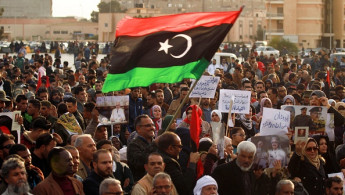Libya parliament approves 2024 budget of $18.5 bln to its installed government
Libya's eastern-based parliament on Tuesday unanimously approved the 2024 budget for the government it installed of 90 billion Libyan dinars ($18.5 billion), excluding an item for development projects, three MPs told Reuters.
The budget is for the Benghazi-based government of Osama Hamad, who came to power in March 2023 and is allied with the military commander Khalifa Haftar, who controls the east and large parts of the southern region of Libya.
Libya's separate Tripoli-based Government of National Unity is headed by interim Prime Minister Abdulhamid Dbeibah, who was installed through a UN-backed process in 2021.
House of Representatives (HoR) member Aisha Tublqi said the item for development projects was excluded from the budget because "the government demanded 30 billion LYD for three years but the parliament wants more details for the projects for approval."
It is unclear if the Tripoli-based Central Bank of Libya (CBL) governor, Sadiq Kabir, will hand over the money to the government of Hamad.
CBL is the only internationally recognised depository for Libyan oil revenues, the country's vital economic income.
"We accepted and approved the budget with taking into account some notes," said HoR member Abdulmenam Alorafi.
In February, Kabir called for a new unified government and a national budget in an apparent challenge to his former ally Dbeibah over government spending, urging for an end to what he described as parallel spending "from unknown sources."
Dbeibah, who is no longer recognised by HoR, has vowed not to cede power to a new government without national elections.
A political process to resolve more than a decade of conflict in Libya has been stalled since an election scheduled for December 2021 collapsed amid disputes over the eligibility of the main candidates and disputes over elections laws.
The dispute over control of government and state revenue, and over a political solution to resolve years of violent chaos, threatens to launch Libya back into administrative partition and war.
In his briefing to the Security Council this month, UN special envoy Abdullah Bathily urged Libyan authorities "to promptly agree on a national budget and decisively address significant deficiencies."
Bathily, who had tendered his resignation to UN Secretary-General Antonio Guterres, said, "The economic situation in Libya is becoming severely strained, amidst warnings from the Central Bank of Libya of an impending liquidity crisis."




 Follow the Middle East's top stories in English at The New Arab on Google News
Follow the Middle East's top stories in English at The New Arab on Google News
![A group of Palestinians, foreign and Israeli activists gather to participated in an olive picking event on the land in the town of Battir, which is under threat of confiscation by Israel in Bethlehem, occupied West Bank on 8 November 2024. [Getty]](/sites/default/files/styles/image_330x185/public/2182930803.jpeg?h=199d8c1f&itok=__0LgGsa)

![People gathered around the rubble of destroyed houses to search for survivors [Getty]](/sites/default/files/styles/image_330x185/public/2024-11/GettyImages-2184733820.jpg?h=199d8c1f&itok=NiM1LO2f)